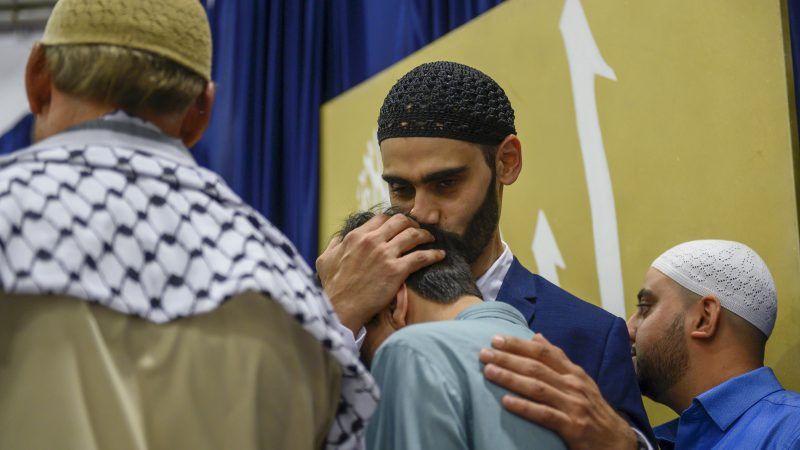When Governments Act on Fear and Panic, Injustice Is Often the Result
It's necessary to confront the threat of white nationalism on the political right, but it must be done without handing new powers to law enforcement and government.

There was a saying, which sprung from the French Revolution and was used during the Russian Revolution: "No enemies on the Left." It was the idea that left-wing revolutionaries should moderate their criticism of anyone on their side of the aisle, no matter what type of extremism they embraced. During the Cold War, conservatives rightly mocked liberals who hedged about the evils of communism. They struggled to condemn anyone to their Left.
Last week, I wrote about the apparent re-emergence of white nationalist thinking. Some mass shooters (El Paso, Pittsburgh, Charleston) seem to subscribe to a white-supremacist ideology, based on their alleged manifestos and police statements. Judging by the reactions to some of the latest shootings, there's a similar philosophy at work: "No enemies on the Right." Everyone condemns the killers, of course, but people hem and haw about the far-right danger.
My column simply called for a recognition of the problem—and the use of existing laws to deal with self-radicalizing white supremacists who break the law. It's the same solution I embraced after the 9-11 terrorist attacks, and after home-grown killers with an alleged Islamic radical viewpoint murdered Americans in a couple of shooting sprees. Facing the issue and using the vast law-enforcement tools already at our government's disposal beats emotion-driven approaches that curtail our civil liberties.
Unfortunately, there are many pitfalls even with using those existing tools. As analysis of the latest shootings subsided, another news story has grabbed attention here in northern California. It offers warnings about what happens when fear and emotion rule the day—and when our government seems driven more by panic than justice. It's from the small Central Valley city of Lodi, but has nationwide implications.
In late July, U.S. District Judge Garland E. Burrell Jr. vacated the conviction and 24-year sentence for a suspect in a 2006 terrorism case. Burrell was the judge who oversaw the trial of Lodi cherry picker Hamid Hayat, who was accused of training in a Pakistani terrorism camp. The feds argued that he allegedly gained weapons and explosives training that used President George W. Bush as a target, according to newspaper reports. This had the makings of a sensational case.
In January, a different federal judge, Deborah Barnes, called for the sentence to be overturned based in part on the inexperience of Hayat's attorney and the government's failure to consider exonerating evidence. She heard "new testimony from witnesses who said, Hayat, a California native, never had time to receive terror training while visiting relatives and getting married in his ancestral village in Pakistan," according to a Sacramento Bee report.
In a 2018 hearing that re-examined aspects of that controversial case, Hayat's attorney alleged that the FBI coerced a confession, "that the training camp he supposedly visited was not even open at the time … and that alibi witnesses who could prove his innocence were not produced at the original trial," according to the newspaper. Here's the best spin to put on this injustice: Our system still is willing to examine evidence years after a case is closed.
In hindsight, the whole matter is so unseemly. The New York Times chaptered-and-versed some of the problems. One former FBI agent watched the testimony and said "it's the sorriest interrogation, the sorriest confession, I've ever seen." (False or coerced confessions are not unusual, but comprise more than a third of the nation's murder exonerations, according to recent studies.)
Meanwhile, newspaper headlines announced the government's dismantling of an apparent terror cell is a tranquil city in wine country. The director of national intelligence, it noted, told Congress that, "A network of Islamic extremists in Lodi, California, for example, maintained connections with Pakistani militant groups, recruited United States citizens."
Except that there was no network. Hayat was the only scalp the FBI could secure, although the agency investigated (but never filed charges) possible immigration violations against local imams. If the Hayat case seemed dubious, it wasn't an outlier.
As LA Weekly reported at the time of the trial in 2006, "The Bush administration claims that more than 400 people have been charged with terrorism-related crimes in the post-September 11 era, and that 228 have been convicted. But the vast majority of these cases have involved minor crimes not directly related to terrorism, such as immigration violations." The feds can appeal Burrell's decision, but after 14 years in prison, Hayat has a good chance of finally being freed. It's unclear how many of those other cases were re-examined.
None of us should minimize potential terror threats, from whatever swamp they might emerge. But our government has plenty of power to investigate and prosecute potential miscreants. Yes, we should all recognize that there are enemies on our Left and Right. But before calling for new governmental powers, we should remember the Lodi case and what happens when emotion rules and the government overplays its hand.
This column was first published in the Orange County Register.


Show Comments (79)